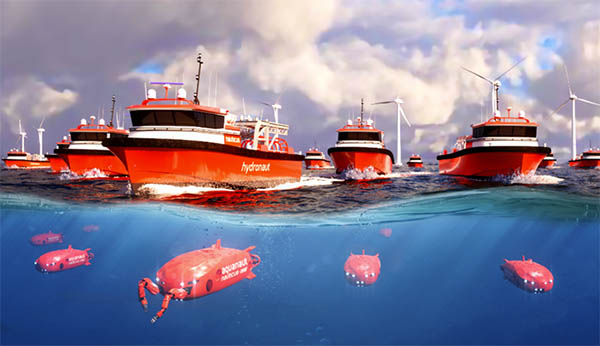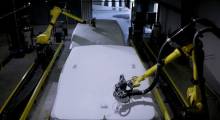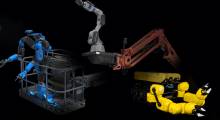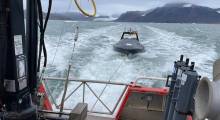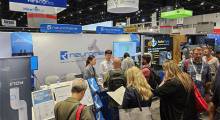From drone swarms and groups of ground vehicles to a new nautical fleet, robotics suppliers and users are finding more uses for increasingly capable systems. Nauticus Robotics Inc. today announced the initial production run of Nauticus Fleet, which will consist of 20 pairs of Hydronauts and Aquanauts.
The Houston-based developer of subsea and surface robots said the duos can be used in applications including undersea maintenance and intervention, as well as data-collection activities.
“Nauticus Fleet represents the most promising operational and technological step changes in this industry,” said Nicolaus Radford, CEO of Nauticus. “We are on a mission to create a future where more autonomous and intelligent robots are used to significantly reduce environmental impact and human exposure to hazards, while at the same time improving the bottom line for our clients.”
Nauticus offers cloud-based software, services, and robotics as a service (RaaS) and through direct product sales. It has developed a range of products for retrofit or upgrading legacy systems and other vehicle platforms.
The company said it provides customers the data collection, analytics, and subsea manipulation capabilities to support and maintain ocean assets. The products and services can also reduce their operational footprint, operating costs, and greenhouse gas emissions, improving offshore health, safety, and environmental exposure, Nauticus claimed.
Nauticus Fleet includes Hydronaut, Aquanaut
Hydronaut is the surface part of Nauticus Fleet. It is an 18-m (59-ft.) optionally crewed autonomous surface vessel (ASV) that supports the launch, recovery, and real-time operations of Aquanaut, its underwater robotic counterpart.
Hydronaut ferries Aquanaut to and from the worksite and supports battery recharges and the communications link from the local remote operations center for supervised autonomous operations.
Aquanaut is a fully electric, free-swimming subsea robot. Users can control it through acoustic communication networking. Aquanaut can perform a wide range of data-gathering, inspection, and manipulation tasks, according to Nauticus.
The uncrewed underwater vehicle (UUV) can operate in two separate modes. It can transform between excursion and intervention configurations. Excursion mode involves the usage of sensors during transit. Intervention mode uses two electric work-class manipulators—Nauticus’ Olympic Arms—to perform work in the subsea environment.
Support, software, and sustainability
Nauticus added that its Houston-based global remote operations center can provide technical support. The company explained that its autonomy and machine intelligence platform, ToolKITT, enables the collaboration between surface and subsea robots.
“Nauticus Fleet uses 21st century ocean robotic technologies to combat climate change and the global impact on the world’s marine environment,” it said. “We at Nauticus believe that this technology will impact the industry in three distinct ways: a greater than 90% reduction in greenhouse gas emissions over conventional methods, a greater than 50% reduction in operational cost, and an up to 90% reduction in personnel deployed offshore.”
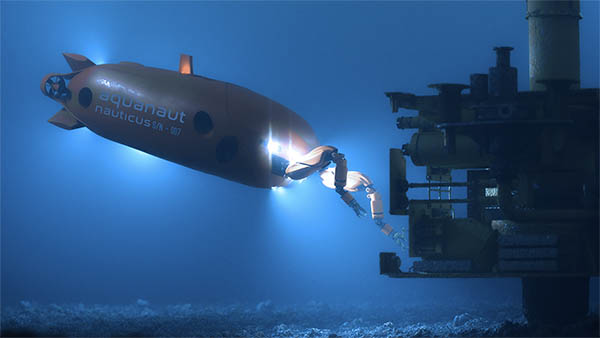
Post-SPAC deployment
In December 2021, Nauticus and CleanTech Acquisition Corp. (CLAQ), a special-purpose acquisition corporation (SPAC), entered into a definitive business-combination agreement that would result in Nauticus becoming a public company.
CleanTech formed in January 2021 with the intention of merging with one or more businesses. CleanTech Sponsor I LLC and CleanTech Investments LLC, an affiliate of Chardan, are the founders and co-sponsors of CLAQ.
Nauticus plans to deliver the first pairs of Nauticus Fleet in the fourth quarter of 2022, with the remainder of orders to be fulfilled by the end of 2024.
The company is also planning regional operations within the Gulf of Mexico, Norway, the U.K., and Brazil. These regional bases will provide local subject-matter expertise and logistics to maintain high-quality services, it said.
Nauticus said it will eventually have operational bases around the world equipped with local remote operation centers and service teams.
Article topics
Email Sign Up

